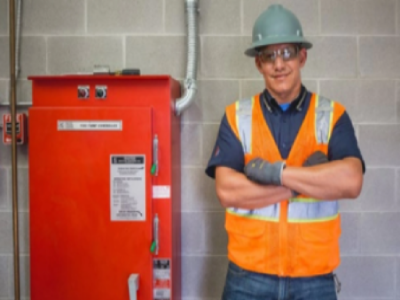Exploring Careers in Fire Protection: A Path to Saving Lives and Protecting Property

The fire protection industry offers a diverse range of career opportunities, from fire safety engineers to emergency response personnel. As cities and infrastructure grow, the demand for qualified professionals continues to rise. This article explores the various career paths in fire protection, key skills needed, and the impact of the field.
The fire protection industry is vital for safeguarding lives, property, and the environment. From fire prevention strategies to fire suppression techniques and emergency response, careers in this sector play an essential role in public safety. With the constant evolution of building designs, fire safety standards, and technological advancements, the demand for skilled professionals in fire protection is higher than ever.
This article explores the different career paths within fire protection, the skills and qualifications required, and why pursuing a career in this field can be both rewarding and impactful.
Career Opportunities in Fire Protection
1. Fire Protection Engineer
One of the most sought-after careers in fire protection is that of a fire protection engineer. These professionals design and implement fire safety systems for buildings, including fire alarms, suppression systems, and emergency exits. Fire protection engineers analyze risks, ensure compliance with safety codes, and develop strategies to minimize fire hazards.
Key Responsibilities:
- Designing and implementing fire protection systems
- Conducting fire risk assessments and hazard analysis
- Ensuring compliance with fire safety codes and regulations
- Collaborating with architects, engineers, and safety teams
- Skills and Qualifications:
- A degree in fire protection engineering, civil engineering, or a related field
- Knowledge of building codes, safety standards, and fire suppression technologies
- Strong problem-solving and analytical skills
- Certification from recognized bodies (e.g., National Fire Protection Association - NFPA)
2. Fire Safety Consultant
Fire safety consultants are experts who advise businesses, organizations, and municipalities on fire safety practices. They conduct fire risk assessments, recommend safety measures, and ensure compliance with local and international fire regulations. Consultants play a crucial role in identifying fire hazards and providing solutions to mitigate risks.
Key Responsibilities:
- Conducting fire safety audits and risk assessments
- Advising clients on fire prevention measures
- Preparing fire safety plans and evacuation procedures
- Training staff and organizations on fire safety protocols
- Skills and Qualifications:
- Certification in fire safety or a related field
- Experience in fire safety risk assessment and compliance
- Strong communication skills to explain complex safety regulations
- In-depth knowledge of fire safety codes and standards
3. Firefighter
Firefighters are on the front lines of fire protection, responding to emergencies and saving lives. They are trained to handle various fire situations, including structure fires, wildfires, and hazardous materials incidents. Firefighters also provide education and prevention services to the public.
Key Responsibilities:
- Responding to fire emergencies and extinguishing fires
- Performing rescue operations and providing emergency medical care
- Educating the public on fire safety and prevention techniques
- Maintaining fire equipment and fire engines
- Skills and Qualifications:
- Firefighter training academy certification
- Physical fitness and endurance
- Knowledge of firefighting tactics and safety procedures
- EMT (Emergency Medical Technician) certification is often required
4. Fire Protection Technician
Fire protection technicians maintain and repair fire protection equipment, including fire extinguishers, alarms, sprinkler systems, and emergency lighting. They ensure that fire suppression systems are functional and up to code, providing critical services to organizations and facilities.
Key Responsibilities:
- Installing and maintaining fire protection equipment
- Testing fire alarms, sprinkler systems, and extinguishers
- Repairing malfunctioning systems and components
- Ensuring that systems meet legal safety standards
- Skills and Qualifications:
- Technical training in fire protection equipment and systems
- Certification from organizations such as NFPA or the National Institute for Certification in Engineering Technologies (NICET)
- Strong troubleshooting and mechanical skills
- Attention to detail and knowledge of fire protection codes
5. Fire Safety Trainer
Fire safety trainers are responsible for educating employees, school staff, and the general public on fire safety practices and emergency preparedness. They conduct fire drills, teach the proper use of fire extinguishers, and instruct people on evacuation procedures in the event of a fire.
Key Responsibilities:
- Designing and conducting fire safety training programs
- Leading fire drills and simulations
- Educating individuals on fire prevention, emergency response, and fire safety equipment usage
- Keeping up to date with changes in fire safety regulations and best practices
Skills and Qualifications:
- Experience in fire safety and emergency response
- Strong presentation and communication skills
- Certification in fire safety training (e.g., NFPA Fire Instructor Certification)
- Knowledge of fire safety equipment and protocols
Skills Needed for a Successful Career in Fire Protection
Regardless of the specific career path, several key skills are necessary to succeed in the fire protection industry:
Attention to Detail:
- Fire safety requires precision and thoroughness. Whether designing fire protection systems or performing inspections, attention to detail ensures that safety standards are met and risks are minimized.
Problem-Solving Abilities:
- Fire protection professionals must be able to assess risks, analyze problems, and develop effective solutions to address safety concerns and improve fire prevention strategies.
Knowledge of Safety Codes and Standards:
- Understanding national and international fire safety codes and regulations is crucial in all roles within fire protection. Familiarity with organizations like the NFPA and OSHA (Occupational Safety and Health Administration) is essential for ensuring compliance.
Communication Skills:
- Fire protection professionals often work in teams or with clients and need to effectively communicate complex concepts. Whether explaining technical information to clients or coordinating emergency response efforts, strong communication skills are vital.
Technical Expertise:
- From engineering systems to maintaining equipment, technical skills are crucial in most fire protection careers. Professionals should be adept with fire suppression technologies, fire alarm systems, and building safety systems.
Why Pursue a Career in Fire Protection?
Impactful Work:
Working in fire protection allows you to make a tangible difference in protecting lives, property, and the environment. Whether you are designing a fire suppression system or responding to emergencies, you are helping keep people safe.
Growing Demand:
As cities grow and new technologies emerge, the demand for fire protection professionals continues to rise. With the increasing focus on safety and risk management in both commercial and residential buildings, careers in this industry offer long-term stability.
Diverse Career Paths:
The fire protection industry offers a wide range of career opportunities for individuals with different skills and interests. From engineering and technical positions to educational and emergency response roles, there is something for everyone.
Job Security and Competitive Salaries:
Fire protection is a critical industry, and qualified professionals are in high demand. Many roles within this field offer job security and competitive salaries, making it an appealing career choice.
Conclusion
A career in fire protection is not just a job—it’s a commitment to protecting lives, property, and critical infrastructure. With various career paths available, from fire protection engineering to emergency response, there are opportunities for individuals with a wide range of skills and interests. The demand for qualified professionals in this field continues to grow, offering stability, job security, and the opportunity to make a meaningful impact.
For those passionate about safety, problem-solving, and making a difference, fire protection offers a fulfilling and rewarding career path that is both challenging and highly valued in today’s society.





.png)







